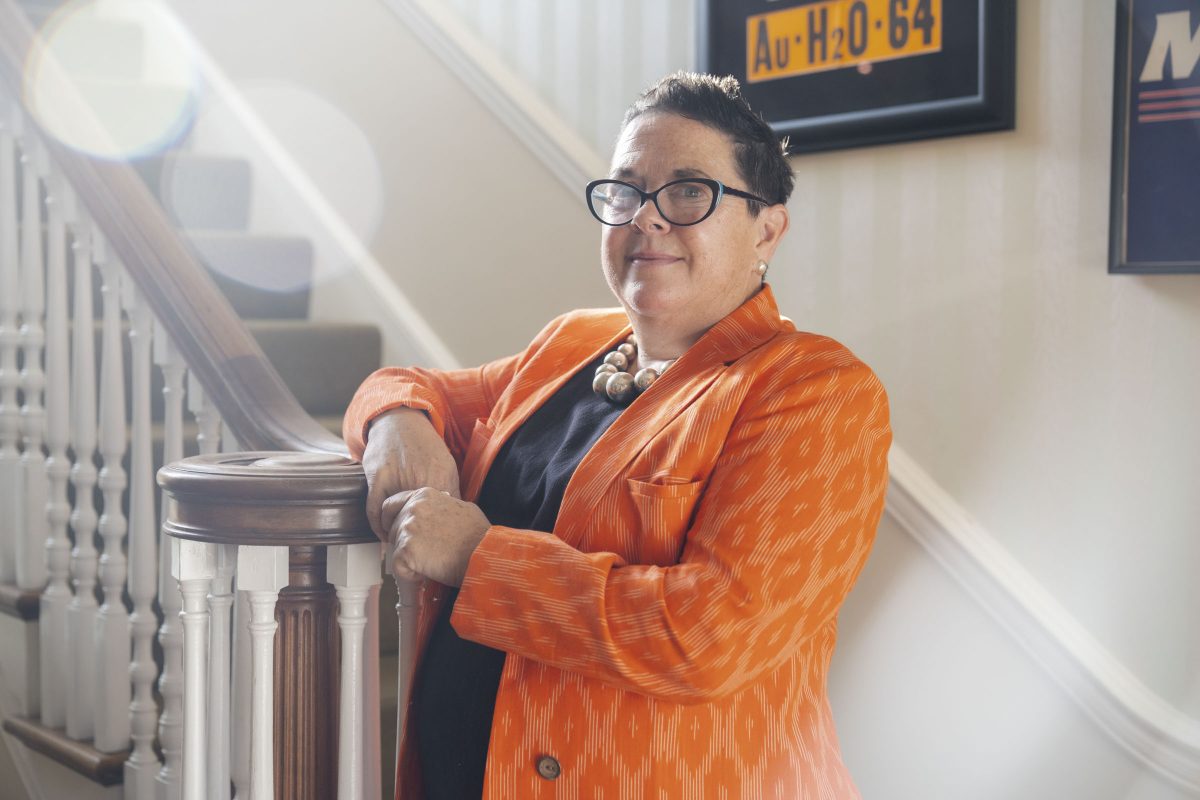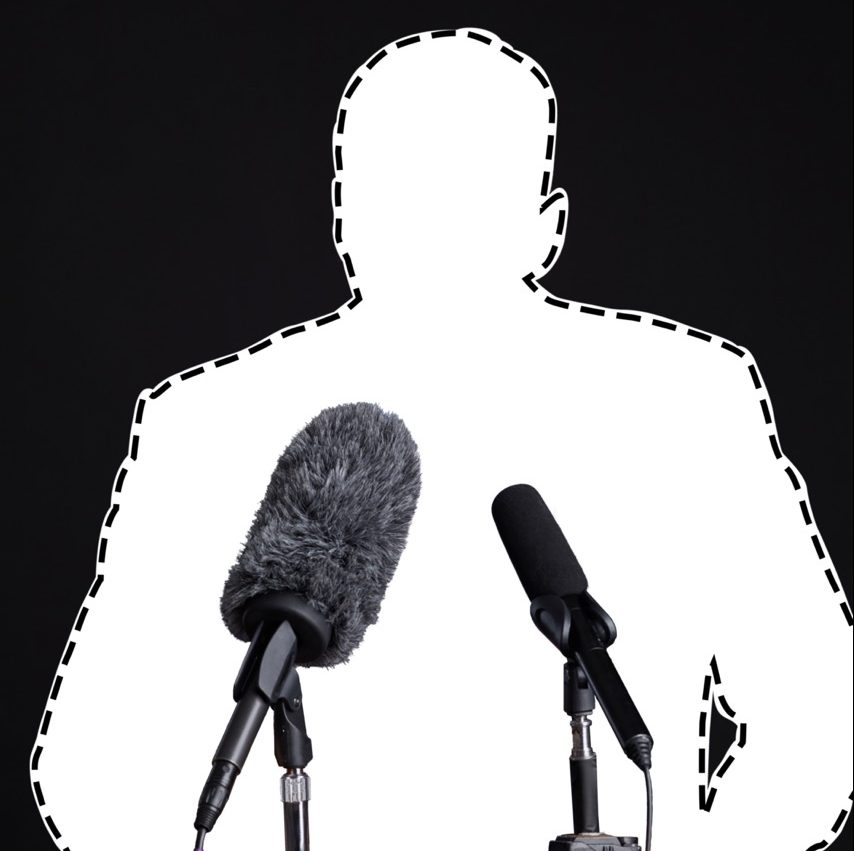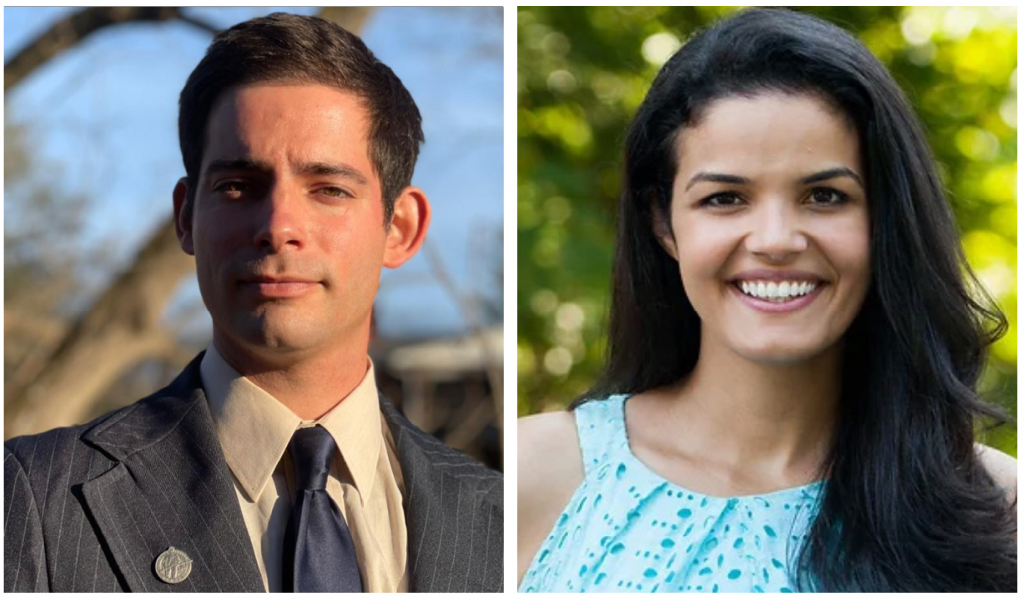It’s difficult.
Even Virginia’s dean of political analysts Larry Sabato didn’t know how to explain three weeks of inaction in the U.S. House of Representatives at the same time two wars raged worldwide and one American party seemed determined to nominate a presidential candidate who has been found liable in two civil suits and is facing four criminal indictments.
“Our system is almost built for deadlock, but this is too much, way too much deadlock,” he told 13 bright-eyed teens from Bolivia and Peru who’d gathered in a dingy Hotel C on UVA’s West Range.
“We’re stuck in a system that was brilliant for its time but maybe we’ve outgrown it,” he said, trying to help the teenagers learn civic engagement in a functioning and, perhaps, non-functioning democracy. (Looking at you, House Republicans.)
The Civil War-era paintings surrounding Sabato on Hotel C’s walls, plus the human skull behind him, underlined the state of the nation and one glaring question: How do we elders convince young people to participate in a democracy on life support, knowing that if we don’t, democracy’s chances of survival diminish significantly?
“We’re very good at campaigning, we’re less good at governing, and that’s become worse over time,” Sabato, UVA’s director of the Center for Politics, told the teens. “It may be too much democracy. It’s certainly too much money. It’s $10 [billion] to $20 billion now; an ocean of money before these candidates because the very wealthy want to invest in candidates so that if something comes up, they’ll always have a hearing.”
Meg Heubeck, the other academic in Hotel C, directs both UVA’s Youth Leadership Initiative and the Center for Politics’ outreach to American teens (plus she’s the president of the local League of Women Voters), and is quite clear about impending prospects.
“The future of the country depends on young people,” she says while showcasing the YLI’s mock election program. “It may be hard for teens to see that, but the future really will depend on young people. If they don’t act—and this is the basics of democracy—if they don’t vote, democracy literally could die.
“It’s vote or die, like a T-shirt slogan.”
Earlier, UVA media professor Bruce Williams told a small crowd gathered for Democracy and Constitution Day on the Downtown Mall, “If we want to save democracy, we need young people to come out and vote.”
Remember, he cautioned, “No one ever believes that they’re voting in the last democratic election in their country.”
To overcome that possibility, singer-songwriter Taylor Swift has partnered with HeadCount and a dozen other pop stars to up voter registration through their social media followings, and Batten School of Leadership and Public Policy professor John Holbein wrote Making Young Voters: Converting Civic Attitudes into Civic Action, which “shines light on how to help young people follow through on their interest in politics and illustrates the need to lower obstacles to registration and voting in the United States.”
Although the data is not yet available, it’s unlikely a majority of 18- to 29-year-olds did cast ballots in November’s off-cycle election for Virginia’s House of Delegates, Senate, school board, and local governmental seats, as only 46 percent usually vote in national elections, 2 percent higher than Jamaica and about half of Sweden’s youth turnout.
With the Brookings Institution reporting that 77 percent of “Plurals” (under age 24) and 56 percent of “Millennials” (under age 40) voted Democrat in 2022’s congressional elections, Republican legislatures across the country have made voting harder, including, in some states like Georgia, refusing to allow water to be brought to voters waiting in line and closing polling places in minority and young-persons’ neighborhoods.
But it’s not just physical barriers: Tufts University’s Center for Information and Research on Civic Learning and Engagement found that only two-thirds of politically interested students had taken courses in government or civics, and illustrated that America’s existing attempts to bring young people into the electorate are “grossly insufficient and further reinforces existing inequities.”
Better efforts, CIRCLE reported, reach younger adults where they’re at, like Heubeck’s mock election, E-Congress, and Democracy Corps programs, or the successes Carah Ong Whaley and team had at James Madison University, where 75 percent of students voted in the 2020 election. With Ong Whaley now at UVA, Virginia’s flagship university undertook a dozen initiatives this year to nudge students to vote, including voters guides, video promotions, and an Election Day donut-themed “Do-Nut Forget to Vote” reminder in all dormitories, plus a well-published run to student polling places with UVA President Jim Ryan.
An upturn in local same-day registration, where voters register and cast ballots on Election Day (their votes are counted after registrations are certified), indicates UVA’s turnout efforts are at least partially successful.
“Our students worked to connect issues that matter to the importance of voting not just in national elections, but in the state and local elections, where decisions are made on policies that impact their daily lives,” Ong Whaley says. “Student-led efforts also aimed to help first-time voters by demystifying the process, so they knew where and how to vote.”
Young Americans, she notes, are anxious about a range of issues, from gun violence and reproductive rights to climate change, which might drive heavier turnout in 2024’s national elections. And following a century of academic studies explaining climate change, young people can literally see that increased numbers and intensity of wildfires, droughts, hurricanes, and tornadoes imperil their future.
After practical time, place, and manner concerns, discussions about getting the young to vote center on connecting with compelling issues. Teen Vogue tells political parties to reach out early and often; to think longer term beyond any upcoming election; to use—but go beyond—digital communications and to remember that there is always a cultural element to all key issues.
“We found that an overwhelming majority of youth said they believe young people have the power to change things,” the magazine reported. “Those who felt that way were more likely to talk to friends about voting, register people to vote, and talk to peers about important issues.”
That’s the focus of a relatively new group at UVA, Students for Equity and Reform in Virginia. Although SERV helped register voters for Virginia’s 2023 election, its prime focus is building a brighter future by getting more students involved in policy nitty-gritty.
“I think young people are inundated with calls to vote; we all get them. But we need to really connect people with whatever issues they care about on a personal level,” says SERV president Kristin O’Donoghue, a UVA fourth-year, who has written for C-VILLE. “That’s the best thing anyone can do. You have to make civic engagement easy and, then, we’re doing our best to connect different advocacy groups across Grounds and make the case about why they should be politically involved. Why they should act. Why they should vote.”
“Strive for the best,” as League of Women Voters’ President Heubeck paraphrases Teddy Roosevelt, “but resign yourself to the best possible.”
Indeed, “Our job is to do the best that we can do and, over time, make the system better,” Sabato told the Peruvian and Bolivian teens. “Most societies have shown progress over time and when you take the longer view, you are not as cynical.”
Regardless of timeline though, he said, “If there is one thing an election analyst can be sure of in America, it’s permanent employment.”




